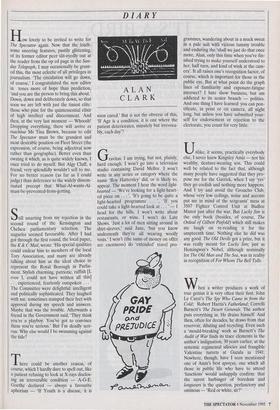DIARY
ALAN CLARK How lovely to be invited to write for The Spectator again. Now that the loath- some sneering features, pastily glistening, of its former editor peer slit-eyedly out at the reader from the op ed page in the Sun- day Telegraph, I may occasionally be grant- ed this, the most eclectic of all privileges in journalism. 'The circulation will go down, of course,' I congratulated the new editor in tones more of hope than prediction, `and you are the person to bring this about.' Down, down and deliberately down, so that soon we are left with just. the tiniest elite: those who pine for the quintessential elixir of high intellect and discernment. And then, at the very last moment — Whoosh! Dropping everything, there will arrive ex machina Ms Tina Brown, because to edit The Spectator must be the grandest and most desirable position on Fleet Street (the expression, of course, being adjectival now rather than geographic). Better even than owning it which, as is quite widely known, I once tried to do myself. But Algy Cluff, a friend, very splendidly wouldn't sell to me. For no better reason (as far as I could judge) than deference to the widely dissem- inated precept that What-Al-wants-Al- must-be-prevented-from-getting.
Still smarting from my rejection in the second round of the Kensington and Chelsea parliamentary selection. The auguries seemed favourable. After I had got through the first round, the local paper, the K & C Mail, wrote: 'His special qualities could endear him to members of the local Tory Association, and many are already talking about him as the ideal choice to represent the Royal Borough in Parlia- ment. Stylish charming, patriotic, raffish [I, even I, could not have written all this] . . . experienced, fearlessly outspoken . . . ' The Committee were delightful: intelligent and politically sophisticated. They laughed with me, sometimes stamped their feet with approval during my speech and answers. Maybe that was the trouble. Afterwards a friend in the Government said, 'They think you're a playboy. You've got to convince them you're serious.' But I'm deadly seri- ous. Why else would I be swimming against the tide?
here could be another reason, of course, which I hardly dare to spell out, like a patient refusing to look at X-rays disclos- ing an irreversible condition — A-G-E. Goethe declared — always a favourite aphorism — 'If Youth is a disease, it is soon cured.' But is not the obverse of this, `If Age is a condition, it is one where the patient deteriorates, minutely but irrevoca- bly, each day'?
Gravitas. I am trying, but not, plainly, hard enough, I won't go into a television studio containing David Mellor. I won't write in any series or category where the name 'Roy Hattersley' did, or is likely to, appear. The moment I hear the word light- hearted — 'We're looking for a light-heart- ed piece on . . . ', 'It's going to be quite a light-hearted programme . . . ', 'If you could take a light-hearted look at . . . ' — I head for the hills. I won't write about restaurants, or wine. I won't do Late Shows. 'Just a lot of men sitting around in shirt-sleeves,' said Jane, 'but you know underneath they're all wearing woolly vests.' I won't (the sums of money on offer are enormous) do 'extended' travel pro- grammes, wandering about in a muck sweat in a pale suit with vicious tummy trouble and enduring the 'shall we just do that once more, Alan, only this time when you've fin- ished trying to make yourself understood to her, half turn, and kind of wink at the cam- era'. It all raises one's recognition factor, of course, which is important for those in the public eye. But at what point do the graph lines of familiarity and exposure-fatigue intersect? I hate show business, but am addicted to its senior branch — politics. And one thing I have learned: you can pon- tificate, in print or on camera, all night long, but unless you have submitted your- self for endorsement or rejection to the electorate, you count for very little.
Unlike, it seems, practically everybody else, I never knew Kingsley Amis — nor his wealthy, denture-wearing son. This could well be related to the fact that, although many people have suggested that they pro- pose me for the Garrick, when I say 'yes' they go coolish and nothing more happens. And I try and avoid the Groucho Club, whose very low ceilings, noise and accents put me in mind of the sergeants' mess at 3507 Fighter Control Unit at Budloe Manor just after the war. But Lucky Jim is the only book (besides, of course, The Ordeal of Gilbert Pinfold) which still makes me laugh on re-reading it for the umpteenth time. Nothing else he did was any good. The Old Devils got a prize, but it was really meant for Lucky Jim; just as Hemingway's Nobel, although nominally for The Old Man and The Sea, was in reality in recognition of For Whom The Bell Tolls.
When a writer produces a work of true genius it is very often their first. John Le Carres The Spy Who Came in from the Cold; Robert Harris's Fatherland; Correlli Barnett's The Desert Generals. The author puts everything in. He drains himself. And then, often for decades, he draws from that reservoir, diluting and recycling. Even such a 'mould-breaking' work as Barnett's The Audit of War finds its trace elements in the author's indignation, 30 years earlier, at the systemic regimental idiocies and frangible Valentine turrets at Gazala in 1941. Nowhere, though, have I seen mentioned one of Amis's best apergus, one which all those in public life who have to attend `functions' would unhappily confirm: that the surest harbinger of boredom and longueurs is the question, perfunctory and ominous — 'Red or white, sir?'










































































 Previous page
Previous page